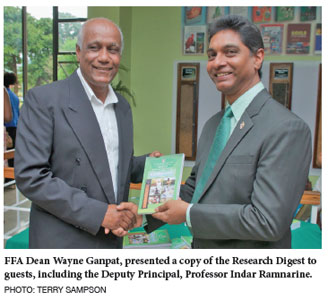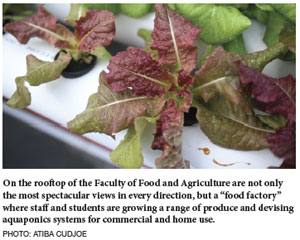 |
 |
 |
|
December 2017 |
Held by the Faculty of Food and Agriculture every Thursday morning at the Frank Stockdale building, this is a sale of produce grown by the Faculty from the farm at Orange Grove and the rooftop greenhouse at St. Augustine. While the quantity is not huge, the quality is superb. Everything is grown using the latest techniques, and some innovative ones, designed by staff and students, says Dean Wayne Ganpat. Selling the produce internally helps the university community to appreciate the high quality of the fruits, vegetables and herbs, but also encourages people to buy local. On Thursday, November 30 however, something more than the Farm Sale was drawing a crowd. The Faculty was hosting its first Research Day in years, so while produce was being sold outside the Sir Frank Stockdale building, inside, posters were on display and academic presentations were being made on the work of the FFA over the past few years. Upstairs, outside the National Herbarium, Dean Ganpat was welcoming guests and launching the Research Digest – a compilation of work from the FFA – classified under seven categories: Food Production; Food Security; Nutrition, Food Safety and Consumer Science; Climate Change; Extension and Rural Development; Geography and the Environment; and Faculty Collaborative Research Projects’ Summaries. Some of the research done included the use of bamboo instead of steel for greenhouse construction. “It showed weight for weight, the load bearing strength of bamboo to be six times that of steel, while its cost is just 20 percent that of steel with labour for harvesting included.” Six times! Who would have thought it? Researchers also studied the prevalence of food insecurity and its determinants, using a sample of low-income participants from north-east Trinidad. They classified 56 % of the households to be food secure. Of the food-insecure households, 11% experienced “moderate food insecurity with hunger and 5% experienced severe food insecurity with hunger.” The researchers also found that the age of the respondent, marital status, ethnicity, education and individual income level were “significantly” associated with food security status. “Lower risk of household food insecurity was associated with higher age, East Indian descent and higher individual income. Higher likelihood was associated with single or divorced marital status. Mild food insecurity was associated with being divorced, or East Indian descent and currently squatting, while higher total household income reduced this risk.” Food security is one of the abiding goals of the FFA. Dean Ganpat tirelessly preaches this mantra, and this morning he was joined by Deputy Principal, Professor Indar Ramnarine; PVC for Graduate Studies, Professor Dale Webber; and Chair of the Coco Research Centre, Winston Rudder when they spoke at the ceremony.
This sentence from one abstract alone tells volumes. “Ultra-processed foods are major sources of nourishment in this population.” In a land full of fruit and vegetables, what are we eating? A separate study looked at our foods and the nutritional implications after visiting 30% of registered supermarkets and groceries over a two-month period. The food was classified as minimally/unprocessed, processed and ultra-processed. Here’s what the abstract says of the 4062 food items that were recorded and analysed. “The levels of food processing were as follows: minimally processed/unprocessed (14.3%), processed (2.6%) and ultra-processed (83.1%).” That is an astonishing amount of ultra-processed foods, isn’t it? There is a lot of information contained in this digest and it is something that should be made available to policy makers, not only in the agricultural sector, but in trade, finance, economics, health, tourism, every facet of our lives. Everyone knows the region needs to work harder towards achieving food security. The food import bill is alarming. We’ve developed tastes for many faraway flavours and have turned away from the homegrown. Agriculture has been consistently treated as a has-been by the State, even while it pays lip-service to the concepts of diversification and sustainable development. The Faculty of Food and Agriculture seems ready to lead the charge towards food security and economic diversification. Here is a list of some of what the FFA produces – why not plan your holiday menu around locally grown produce?
|



 Every Wednesday, when the daily What’s On goes out by internal email to staff and students, the notice of the Farm Sale gets the most hits (at least it seems so).
Every Wednesday, when the daily What’s On goes out by internal email to staff and students, the notice of the Farm Sale gets the most hits (at least it seems so).  Dean Ganpat mentioned the high food import bill, which has been estimated at TT$4.5 billion, and Prof Webber spoke about lifestyle diseases as he talked about the research clusters that have been formed to maximize resources. The abstracts in the Research Digest provide a fascinating look at what the Faculty has been doing, but they give a better understanding of where we stand, because the research is very diverse.
Dean Ganpat mentioned the high food import bill, which has been estimated at TT$4.5 billion, and Prof Webber spoke about lifestyle diseases as he talked about the research clusters that have been formed to maximize resources. The abstracts in the Research Digest provide a fascinating look at what the Faculty has been doing, but they give a better understanding of where we stand, because the research is very diverse.